DOCTOR WHO – ‘Revolution of the Daleks’
The Doctor escapes from her alien prison with the help of an old friend, and returns to help prevent a disaster.
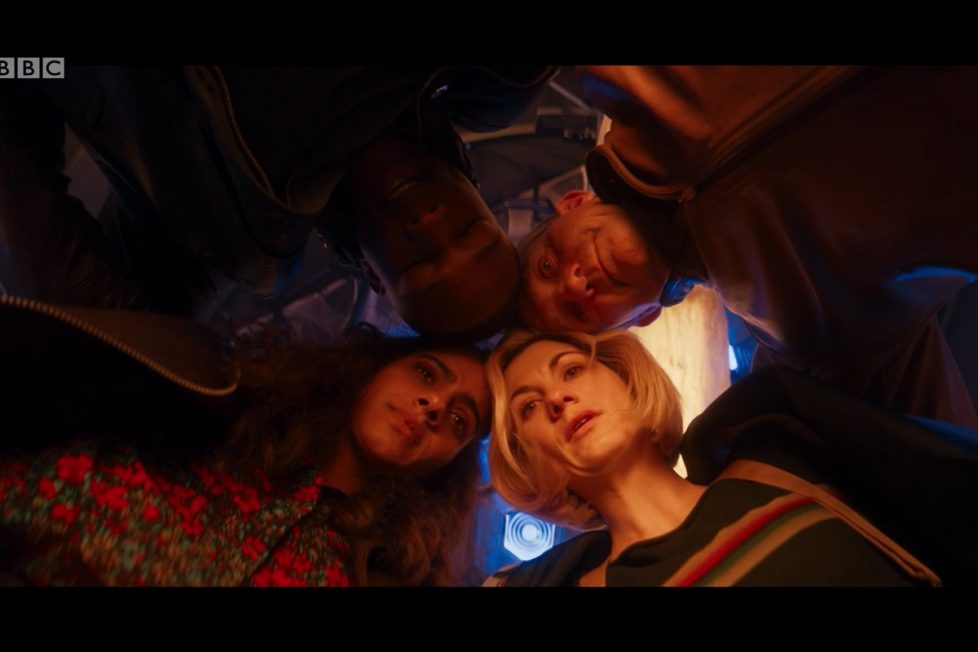
The Doctor escapes from her alien prison with the help of an old friend, and returns to help prevent a disaster.


The title of this year’s Doctor Who special is a little disingenuous. Rather than the dramatic uprising it promises, it only seems to fulfil the anodyne need for another word beginning with ‘R’ that can prefix ‘of the Daleks’. Hardly revolutionary, as the latest in a line of similarly titled titles, it borrows heavily from them all—especially “Revelation of the Daleks” (1986) and “Remembrance of the Daleks” (1988). This sense of familiarity is also reflected in the memory-jogging pre-titles sequence, proposing a direct sequel to last year’s special “Resolution”. It opens with a Star Wars in-joke, situating the trashing of the Reconnaissance Dalek “a long time ago… far, far away” in GCHQ, Cheltenham. New Year’s Day 2020 does seem an eternity ago, as does the transmission of “The Timeless Children” last March, given that the world’s since undergone such a traumatic transformation.
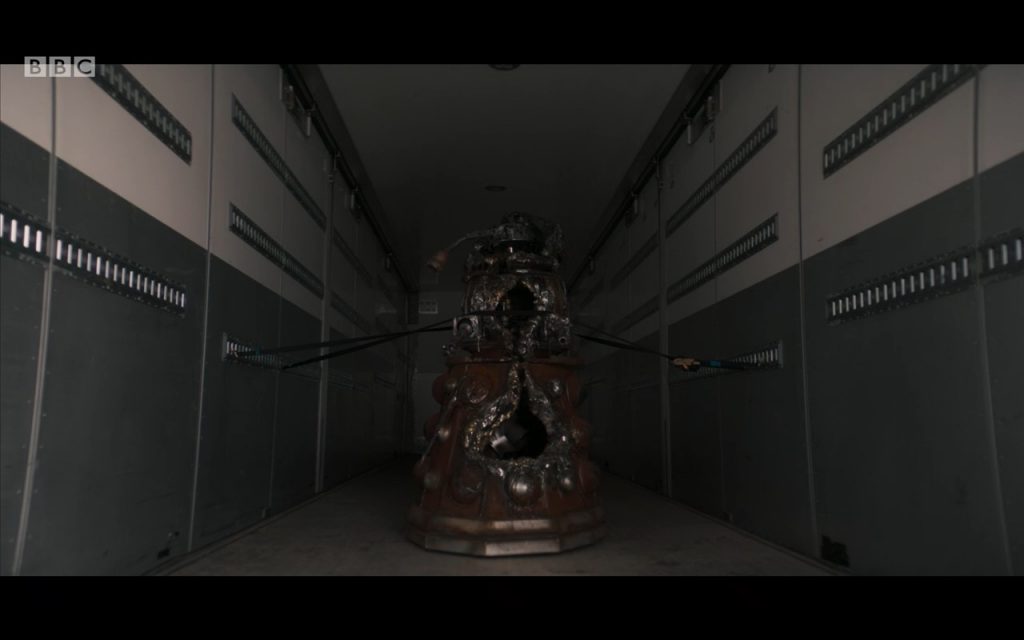
367-minutes after the events of “Resolution” and, before we get to the first act proper, writer Chris Chibnall details the aftermath of the Recon Dalek’s demise. Its remains are shipped off to Depository 23, with an MoD minion observing it’s been a “long time since we opened that one.” Presumably it’s a covert government facility unrelated to UNIT’s Black Archive alien artifact repository. Perhaps we’ll never know! There’s a slippery, false empathy between the two GCHQ employees, Rachel (Helen Anderson) and Armen (Nathan Armarkwei Laryea), with the former anticipating what’ll happen to him and the transported remains, glossing over the latter’s concerns about safety with small talk about his mother. A painful reminder that civil servants and politicians spend most of their time deflecting everyone’s concerns, even their own.
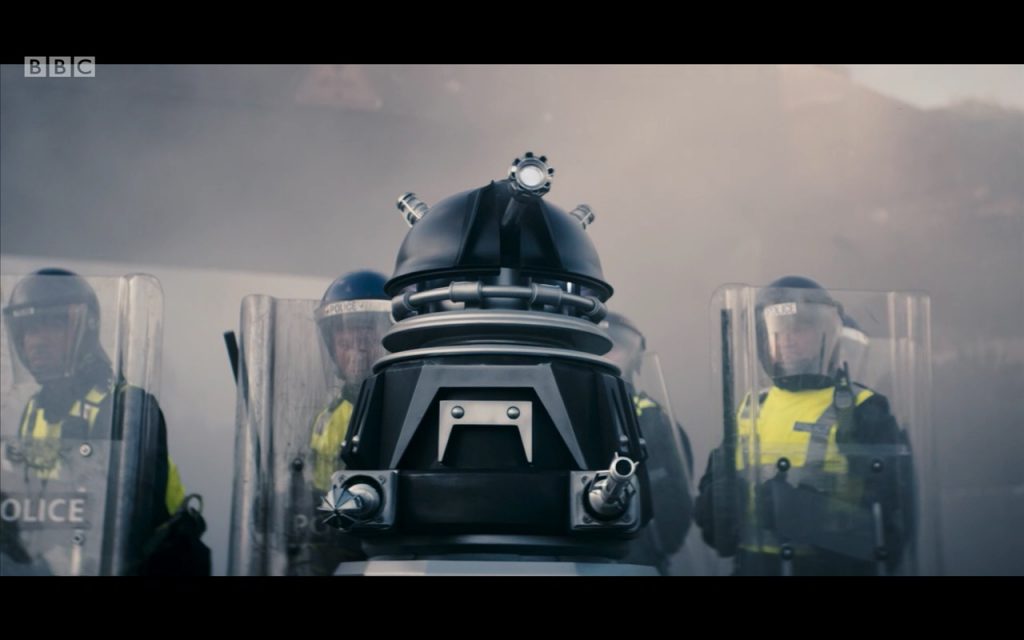
This is a world where carting around the corpse of an evil Skaro mutation in an articulated lorry is casually conducted on motorways and at dodgy burger vans without security. Nobody, let alone Armen, even questions it. No wonder this episode’s sinister capitalist, Jack Robertson (Chris Noth, reprising his Trumpian villain from “Arachnids in the UK”), has the ‘burger van owner’ hijack said artic. Will labelling Robertson the “American Mike Ashley” register with viewers? If a sportswear retailer did develop a robotic security force, it would certainly be properly attired for military exercises. Echoes of Trump’s Space Force is perhaps reinforced by the corporate livery Robertson’s scientist gives them.
Robertson meets Technology Secretary with a “£2.70” budget and Prime Minister-in-waiting Jo Patterson (Harriet Walter, continuing Who’s tradition of hoisting the corrupt politician by her own petard) to firm up a deal with “super-psyched” turbo-boosting scientist CEO Leo Rugazzi (Nathan Stewart-Jarrett) to develop a security drone that’ll enforce Brexit by any other name. Chibnall had no idea that, since he wrote this, trust of politicians is at more than “an all-time low.”
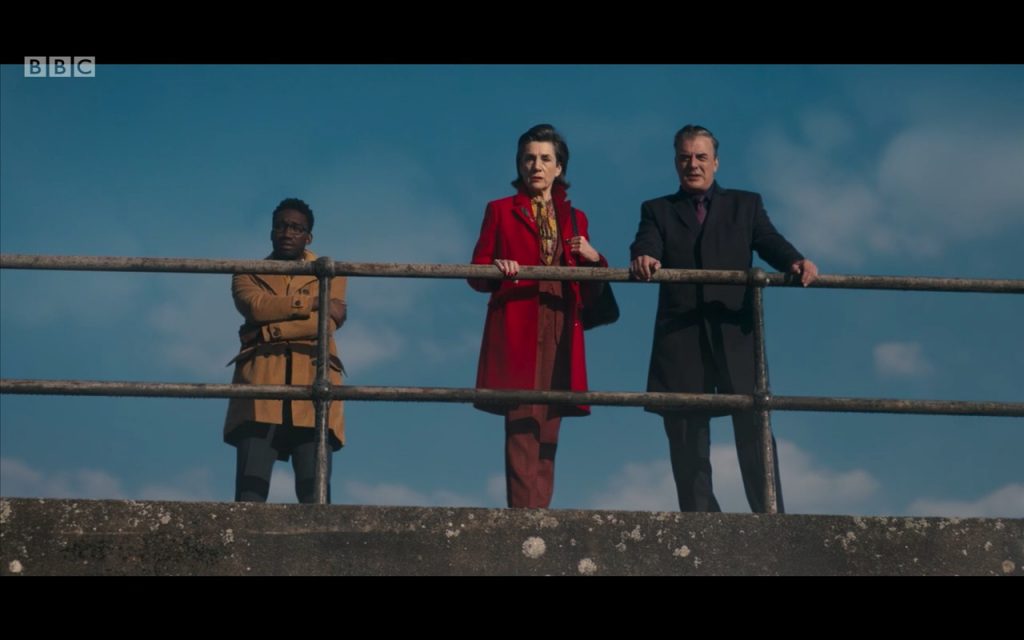
Well, Patterson does get her £2.70 worth, that’s for sure, and Robertson stages an effective role-play to demonstrate what might happen to any of those angry lorry drivers ever stuck at Manston Airport again, or those protesting about anything, anywhere at any time. It is all very on the nose and, later, it’s the expert’s know-it-all thinking clever to “embrace the uncertainty” and cultivate the DNA of a Dalek, who get roped into the political revolution analogy.
Post set-up, “Revolution” has a specific job to do in its first act before it gets to grip with the primary story. The Doctor (Jodie Whittaker) has to deal with, and escape from, incarceration—and, like all of us in lockdown, having been given more time to dwell upon our lives, ponders last year’s revelation she’s not who she thought she was. Back on Earth, The Doctor’s “fam”—Yaz (Mandip Gill), Ryan (Tosin Cole), and Graham (Bradley Walsh)—also have to deal with her absence. As we’re aware from past experiences, a missing Doctor can have a traumatic effect on those who’ve travelled with the Time Lord, as they try to accommodate what they’ve learned from their death-defying experiences. It’s like a bereavement when these fellow travellers come crashing back down to Earth.
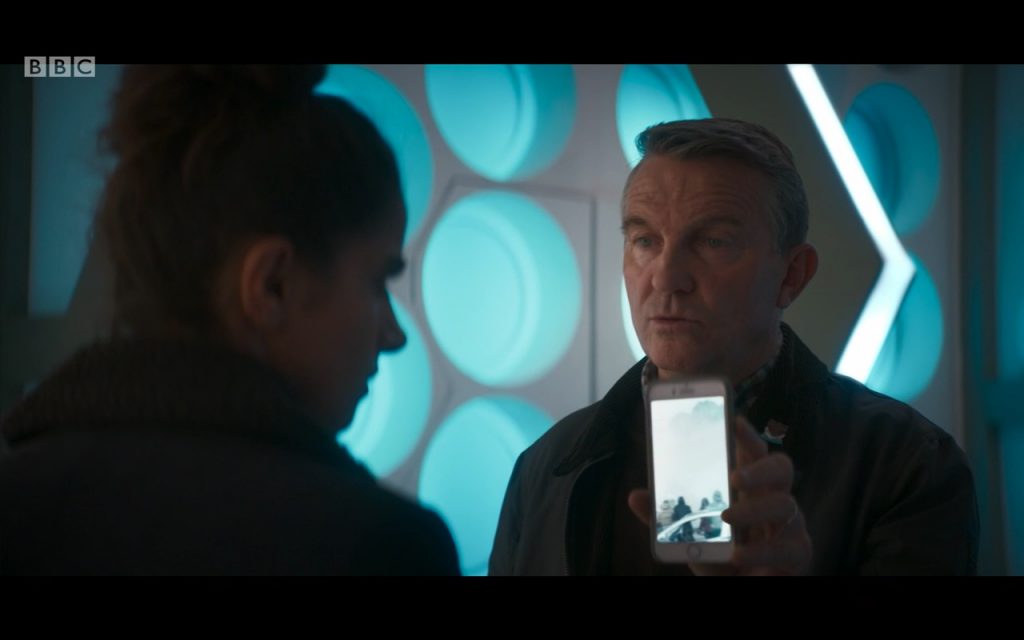
So, some soul-searching ensues for both The Doctor and her friends. As The Doctor paces the equivalent of the space prison’s exercise yard, getting familiar with her CCTV cameras and fellow jailbirds—including a Pting, one of The Silence (“oh, I forgot you were here”), and a Weeping Angel(a), the people on Earth waiting for her return, consider her absence.
Chibnall also has to seed in the departures of Ryan and Graham. Both have now turned their attention to the world they left behind, seeing in a New Year in the 10 months since their return, while Yaz still desperately searches for a way to find The Doctor, sleeping in the disguised TARDIS taken from Gallifrey. “We have to get on with our lives,” suggests Ryan, setting up what will be his own reckoning by the time the episode closes. Graham, likewise, reminds her that she’s distracted from a purpose The Doctor originally instilled in them, one that requires them to keep an eye on Earth. Leaked footage of the role-play with Robertson’s Dalek provides the catalyst for the fam to fulfil their duty.
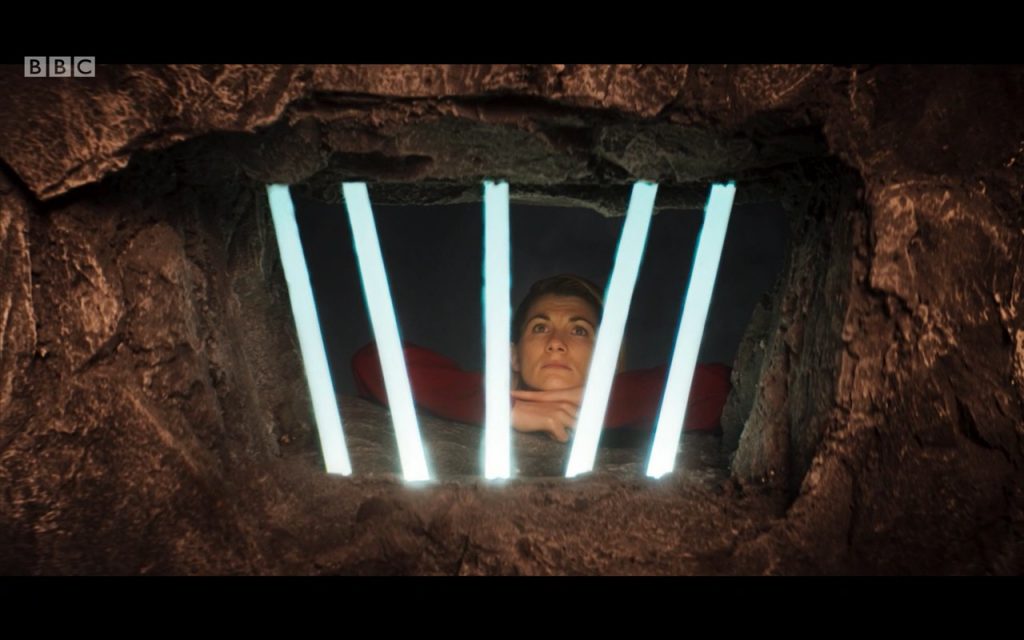
Having fixed the election for Patterson, tax-avoiding Robertson (he’s now your pick of Bezos or Zuckerberg) is instructed to roll out the drones nationally so that PM Patterson can get busy patrolling our borders. When Yaz, Ryan, and Graham confront him, he’s more than able to have his security remove them after they weakly witter on at him about a Dalek. Trying to save the planet without The Doctor, a working TARDIS, or a handy bit of psychic paper, is a bit of busted flush for the fam. As Graham succinctly puts it, “this is hard, innit?” It needs another approach. Enter, everyone’s favourite 51st-century Time Agent, Captain Jack Harkness (John Barrowman)…
The inevitable prison break, all temporal-freezing gateway disinhibitor bubbles and square guns, reintroduces The Doctor to Jack, allowing them some waspish banter about face lifts before the episode gets on track to reunite The Doctor with her TARDIS. Chibnall calms things down and gets under The Doctor’s skin to figure out what legacy “The Timeless Children” has for the series and the character—where she was in put prison “for being me and right at the point where I wasn’t sure what that meant”. After 10 months apart the strength of Yaz’s feelings, when the TARDIS lands in front of her and the others, is plain to see in the almighty shove she gives The Doctor.
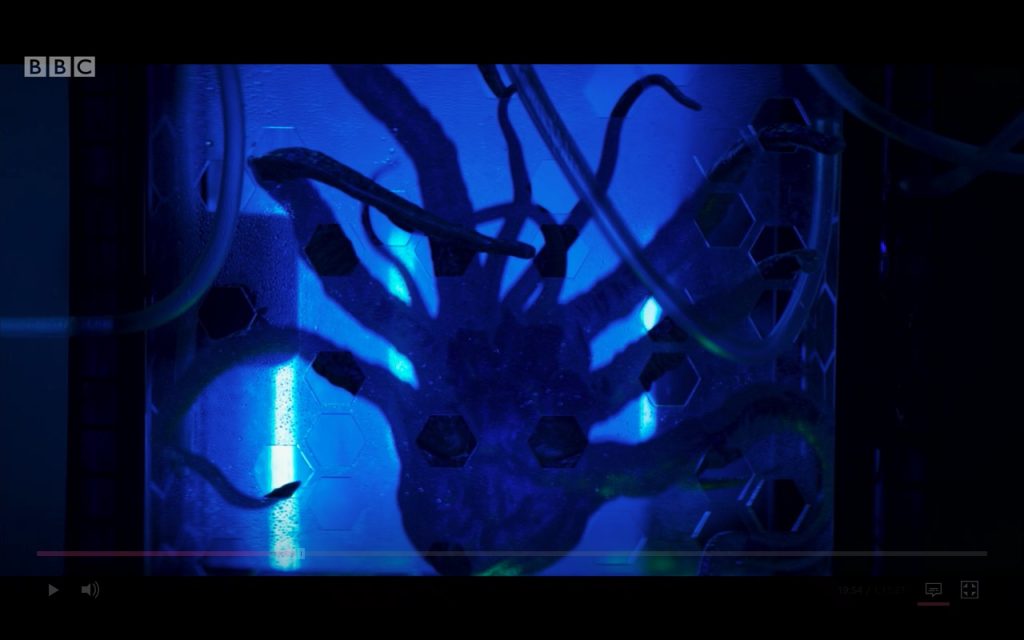
Meanwhile, when Leo reveals the creature he’s cloned from the remnants of the original Dalek machine, even Robertson is aghast. The warning signals, that the creature already accessed the networks and is gathering strength, simply preempt the inevitable. Leo tries to incinerate the creature on Robertson’s instructions but it insists on leaping out of its casing like a face-hugger from Alien (1979) and, before we know it, he’s under its possession and setting up a clone factory in Osaka—just a Dalek puppet manipulating the last vestiges of Leo’s humanity to pause only for a brief ‘tell the kids I miss them’ conversation with his wife. Collateral damage in a time of uncertainty.
Back together, there’s some further soul searching for The Doctor and her friends. While they get a hint of what has happened to previous companions, with Jack’s immortality partly blamed on Rose now being trapped in a parallel universe, they still have to have awkward conversations with The Doctor. Dropping Jack and Yaz in Osaka and visiting Robertson at his facility, now 3D printing the security drones, Chibnall takes time to examine what’s happened to The Doctor’s friends. With Jack in tow, we also have two immortals recognising and sharing the pain of leaving friends behind. Yaz shares with Jack how her life has been affected by The Doctor’s absence. Similarly, he acknowledges it’s “a hard way to live” when the adventure abruptly comes to a halt. She was upset “to be shown something I couldn’t have anymore.” Yaz is definitely not ready to end the adventure!
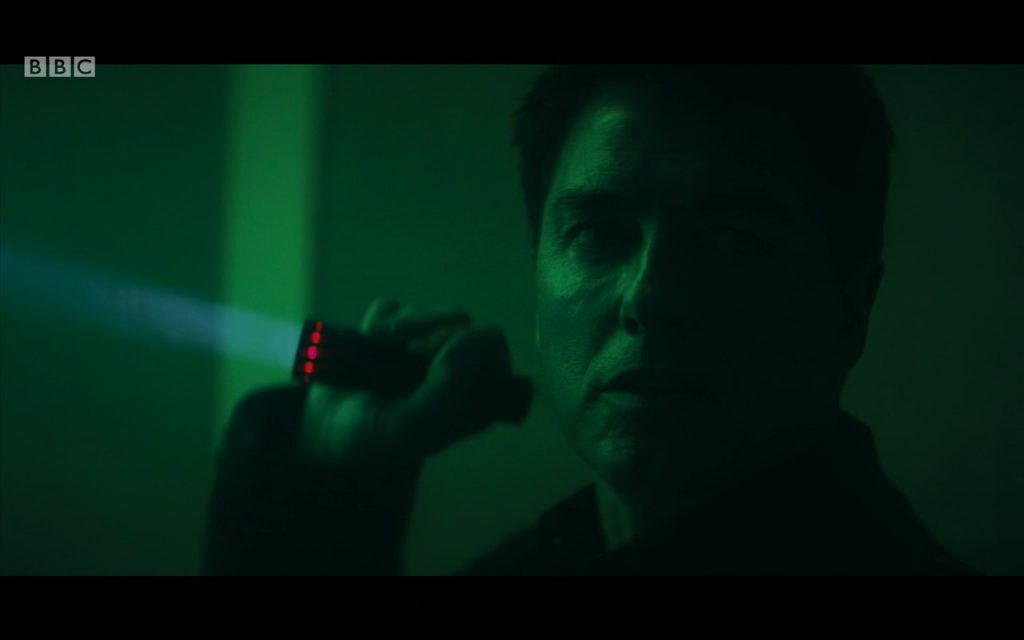
Likewise, on the way back to Osaka to help them, Ryan and Graham have the same conversation with The Doctor. A more mature Ryan, who’s bonded back with his friends and family, is already having doubts about continuing his travels with her and would rather stay at home. Ryan tries to tell her that things change because they should and, given that she’s found out her origins aren’t what she believed they were, that “new can be very scary” and she should confront “the new, or the old.” A heartfelt scene and a little message from Chibnall to Whovians still unsure about the bold changes to Doctor Who’s lore made in “The Timeless Children”.
Attacked by Dalek creatures in Osaka, the friends decide to blow up the facility. However, and again inevitably, the creatures have already prepared for this and, knowing there are thousands of empty Dalek security drone casings to occupy and control, they use ultraviolet light to recombine with them.
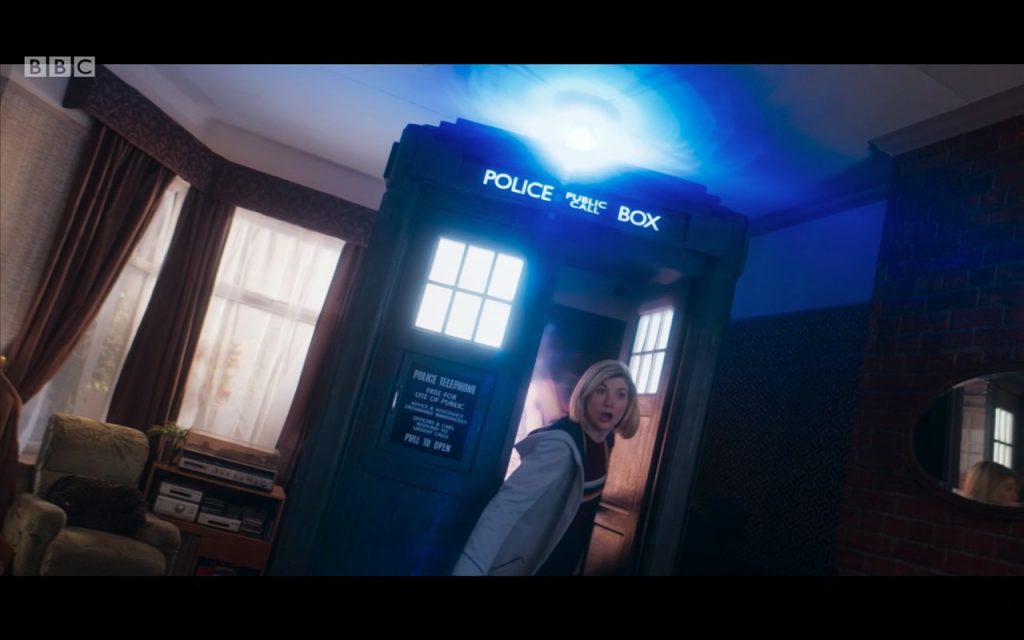
The third act is essentially another uninspiring Dalek conquest of Earth, with rampant exterminations polishing off a Prime Minister having “teething issues with the drones”, the police force, the army and, pointedly, those daring to leave or enter the UK. The only hope is for The Doctor to opt for the “nuclear option” and call in the original Daleks and set off a Dalek civil war, as purity of the race has always been a sticking point with the bubbling masses of hate from Skaro, since Davros polluted the gene pool back in “Resurrection…” (1984) and “Revelation of the Daleks” (1985).
Borrowing several pages from the Russell T. Davies’ playbook of Dalek spectacle, up pops a Dalek saucer and the familiar gold occupants take to the skies to do battle and purge Robertson’s impure Daleks, culminating in a spat about racial purity on Bristol’s Clifton suspension bridge (ironic, given the city’s history and recent events). Of course, in “backing them” Robertson also shops The Doctor to the Daleks because, like many dubious political aspirants and incumbents, he’s a two-faced conniving capitalist only in it for himself. The positive side of this is that The Doctor once again defines herself, after a long period of self-doubt “in a cell wondering who I am.”
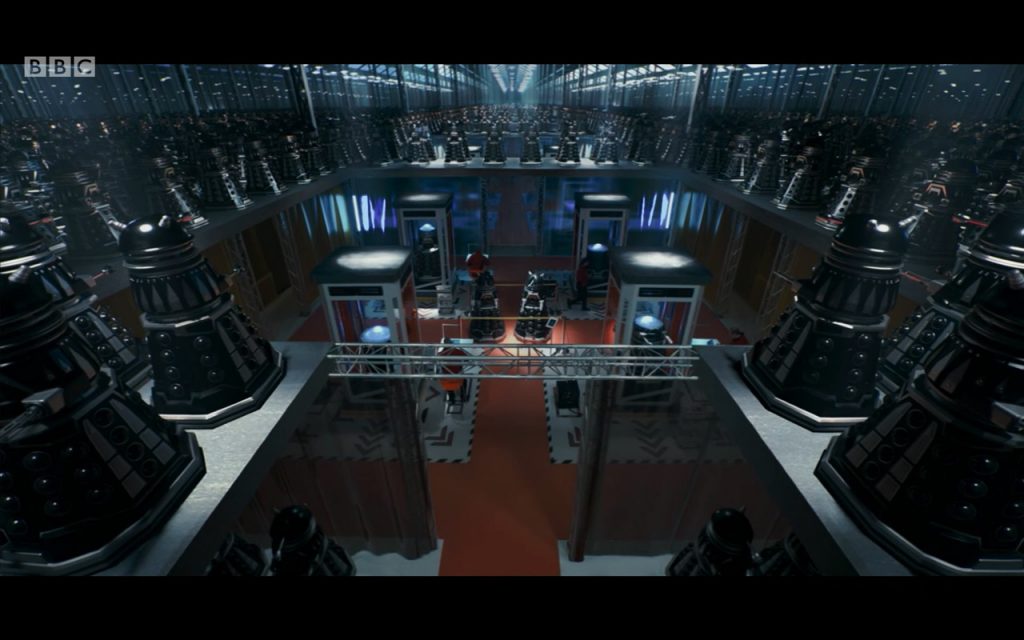
The Daleks have always been the implacable evil against which the Time Lord’s been measured, and it’s no different here when she makes a statement of intent: “I’m The Doctor. I’m the one who stops the Daleks.”
The Daleks’ hatred of ‘the other’ is symbolically expressed in the confrontation between the gold Daleks and the last remaining vestiges of the Recon Dalek. Even as it reasons for its own survival, as a loyal Dalek drone with a willingness to become pure, this is deemed inadequate. The only purification for such a genetic anomaly is one by fire, delivered by extermination.
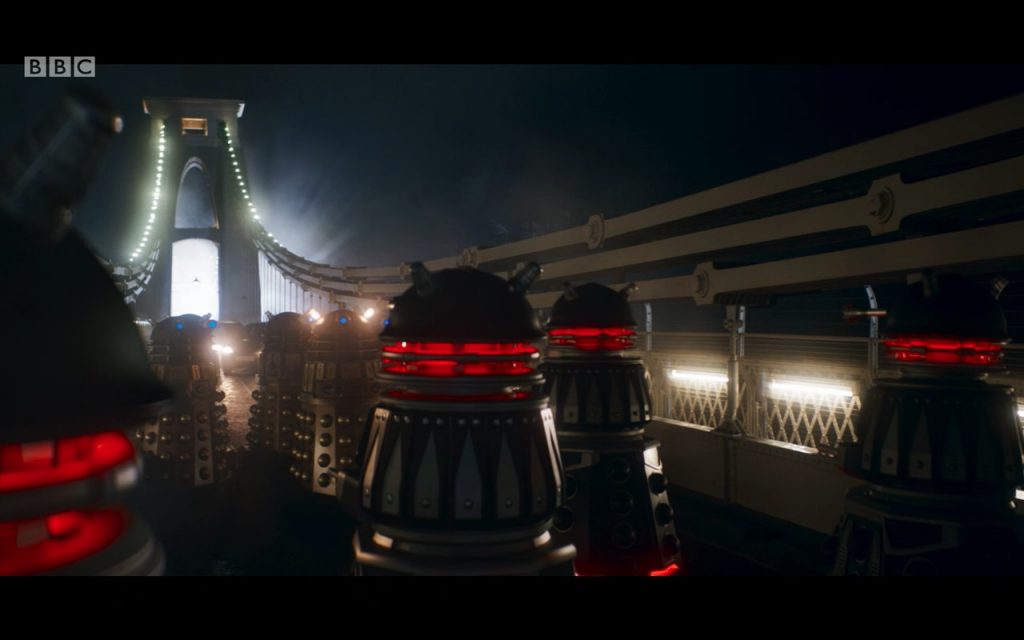
Fortunately, The Doctor and her friends are on hand to blow up the Dalek saucer and a spare TARDIS certainly comes in handy for “the old switcheroo” to round up the leftover Daleks and hurl them into the void, that emptiness found between all parallel worlds. While it’s basically spectacle on rinse and repeat, this still remains a triumph for VFX and set design and the combined efforts of director Lee Haven Jones and director of photography Luke Bryant. A shame the script couldn’t have managed it all with a smidgen of originality.
Beyond sending the Daleks packing again, the episode leaves time to add in the goodbyes from Ryan, Graham, and Jack—although oddly we only hear, and don’t see, the latter’s departing lines! I find Ryan’s departure a difficult sell. Tosin Cole’s never been given consistently well-written material for his character and it’s hard to invest much in Ryan’s sad decision to stay on Earth. Ryan’s learned that life can be terribly unfair at times and he has decided to face it, particularly in reconnecting with his family and friends when life now seems so short. Bradley Walsh made Graham endearingly his own.
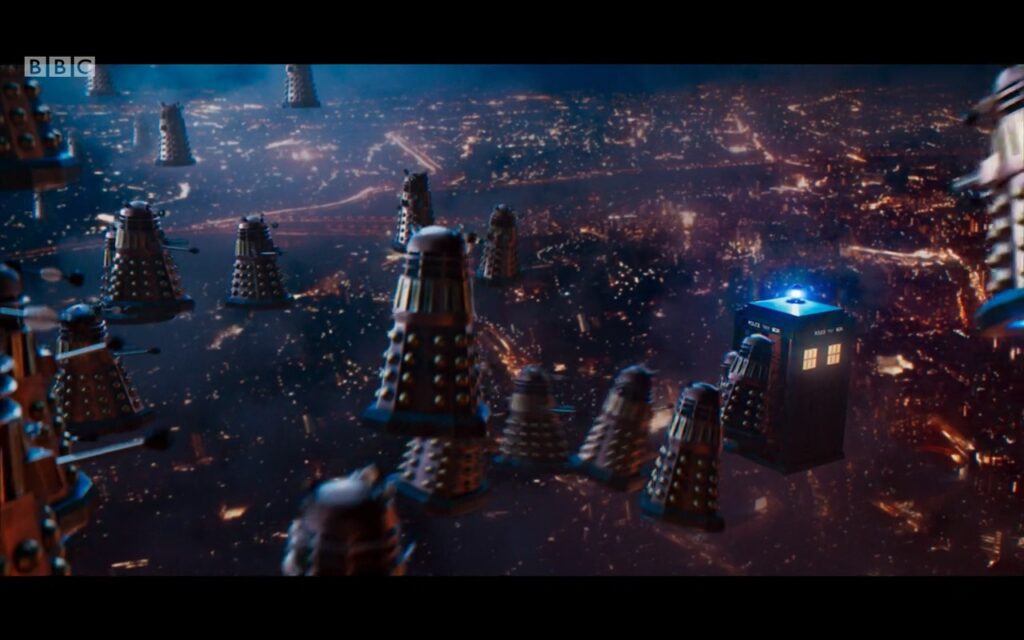
Graham’s exit, wanting to stay with his grandson is understandable, as he’s a familial link to his dead wife Grace. That Grace materialises briefly as a presence in the final scene underlines that spiritual connection within Graham and Ryan’s memories of her. These are heartfelt but, for me, quite low key departures, best enhanced by coming full circle to the start of Ryan and Graham’s association with The Doctor. Ryan returns to something as mundane as riding a bicycle, while Graham encourages him, but they do have the added responsibility (thanks to psychic paper) of perhaps helping protect the Earth in the Time Lord’s absence. It’s a wistful ending to a rather average episode.
Finally, a few thoughts on the casting announcement tacked onto the end of the special. I don’t know John Bishop’s work, either as an actor or a stand-up comedian, so I’m not qualified to venture an opinion. Despite questions raised in some quarters, he’s an actor with credits in a number of film and TV productions. Again, I don’t know whether he has the acting chops for Doctor Who because I’m unfamiliar with his work. Comedians and comic actors have a good track record on the series, however, and recalling the vitriol that greeted Catherine Tate’s casting, I’m for keeping an open mind.
However, I do hope his character Dan isn’t a re-tread of Bradley Walsh’s Graham. What does disappoint me is that Chibnall felt the need to replace Walsh with a similarly white, male, middle-aged character. Why not let Jodie and Mandip lead the series?

writer: Chris Chibnall.
director: Lee Haven Jones.
starring: Jodie Whittaker, Bradley Walsh, Mandip Gill, Tosin Cole, John Barrowman, Chris Noth, Nathan Stewart-Jarrett, Jo Patterson, Helen Anderson & Nathan Armarkwei Laryea.
